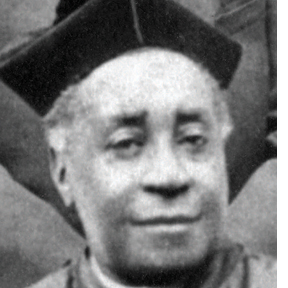Alexander C. Victor Cartier
Eighth Rector (1906-1912)...

The Rev. Alexander C. Victor Cartier, 8th rector of the African Episcopal Church of St. Thomas (1906-1912), likely had the most varied geographic experience serving in the Episcopal Church of any other priest who had served St. Thomas up to that point. In 1887 Mr. Cartier, a layperson, was serving in some capacity in Denver, Colorado at the Church of the Redeemer, a “colored” congregation in the Diocese of Colorado, with almost 90 parishioners. Mr. Cartier, in 1891, described as a “former Romish monk,” was serving as the Proctor of Hoffman Hall a seminary founded by the Rt. Rev. Charles Todd Quintard, Bishop of the Diocese of Tennessee, for the purpose of training “colored men for the work of ministry.” Bishop Quintard ordained Cartier a deacon in 1894 and a priest in 1895. He immediately started serving as priest-in-charge of St. Augustine’s Mission, Nashville. By 1897 Fr. Cartier was also serving at St. Cyprian’s, Gallatin. That same year The Rev. Robert Caswell, Archdeacon for Colored Work for the Diocese of Tennessee, stated in his report “The Proctor [of Hoffman Hall], the Rev. A.C.V. Cartier carefully arranges every detail of the Chapel Services so as to conduce to reverence and Christian joyfulness. A high standard is aimed at in the daily Choral Services, and well attained.” By 1902 Rev. Cartier was serving at St. Philip’s Mission in the Diocese of Minnesota where it was recorded that he transferred to the Diocese of Colorado that same year. In 1903-1904 Rev. Cartier is shown as serving in Ocala, Florida in the Diocese of Southern Florida. On December 16, 1905 Rev. Cartier was noted as being received into the Diocese of Pennsylvania. The 1906 Council Journal of the Diocese of Colorado reports that Rev. Cartier had formally transferred to the Diocese of Pennsylvania.
The 1906 Diocese of Pennsylvania Journal identifies Rev. Cartier as the rector of St. Thomas. That year Lewis M. Mintess served as the Rector’s Warden and Richard J. Warrick, M.D. served as the Accounting Warden. Fr. Cartier’s salary is recorded as being $900 a year and there was a mortgage on the 12th St. church property in the amount $3,500. Also, in 1906, The Rev. Robert Josias Morgan, a native of Jamaica, was serving as the rector of the Church of the Crucifixion. Fr. Morgan had served as a lay reader in Sierra Leone under Bishop Samuel Ferguson before being ordained an Episcopal priest in 1895 by The Rt. Rev. Leighton Coleman, Bishop of Delaware. Fr. Morgan, who appears to have known The Rev. Henry L. Phillips, and The Rev. George Alexander McGuire, was said to have been a good friend of both Fr. Cartier and The Rev. George Freeman Bragg, rector, St. James Church, Baltimore, Maryland. Curiously, in 1907 Fr. Morgan left the Episcopal Church, and according to historian Oliver Herbel, was ordained as Fr. Raphael Morgan becoming “the first man of African American descent born in the new world to be ordained in the Orthodox Church” based in Constantinople. Herbel suggests that both Cartier and Bragg were interested in Eastern Christian apostolic succession and that in 1908 Fr. Morgan recommended Fr. Cartier as a candidate for ordination in the Orthodox Church. The recommendation does not appear to have borne fruit.
In 1912 Fr. Cartier found himself in the ignominious position of having a contentious parish vestry election dispute settled in the civil courts of the City and County of Philadelphia. Nineteen congregants were precluded from voting at the March 1912 parish meeting. All or some of the disenfranchised voters filed a bill in equity in the Philadelphia County Court of Common Pleas under the name James T. Howard, et. al. vs. The Minister, Churchwardens, and Vestrymen of the African Episcopal Church of St. Thomas … A.C.V. Cartier et. al. The matter was referred to a special master Charles Biddle, Esquire. Biddle was a member of a prominent Philadelphia family, a noted attorney retained at times by the Attorney General of the Commonwealth of Pennsylvania, a member of the City Club of Philadelphia, and chair of the club’s committee on the formation of a Municipal Court for Philadelphia. Charles Biddle found that while several of the petitioners – including Dr. Algernon B. Jackson - had been rightfully denied the right to vote for failure to pay the monies pledged in 1911 – seven others including Charles E. Cornish, Alonzo Porter, and Egbert Rosell – had been unfairly disenfranchised by the application of an invalid bylaw amendment requiring that pledges for 1910 also be fully satisfied. St. Thomas, seeking to affirm the action disenfranchising the seven voters, appealed the findings of Biddle’s report. In October of 1912 a six-judge panel led by the President Judge unanimously affirmed Biddle’s report holding that the bylaw amendment employed to disenfranchise the seven voters was repugnant to both the parish’s charter and constitution. Costs of the appeal were ordered to be paid by St. Thomas. In November Fr. Cartier gave the opening prayer at the Founders’ Day ceremonies at Douglass Hospital but the December 21st issue of The Churchman announced his resignation as rector of St. Thomas. An article in the New York Age suggests that Fr. Cartier’s departure was the result of the parish owing him a salary arrearage of over $2,000.